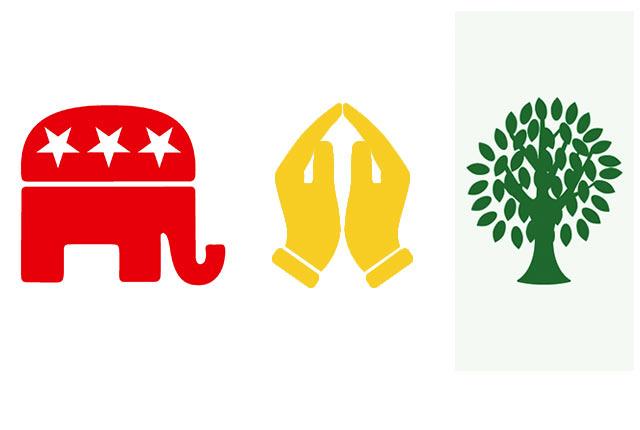
Religion trumps politics when it comes to the environment
Religion trumps politics when it comes to the environment. Some people have perceived that the combination of religion and political conservatism exacerbates environmental concerns in the United States. But researchers from Rice University and Baruch College have found evidence that religious identification and belief in a god dampen the otherwise strong negative effect that political conservatism typically has on whether people make purchasing decisions with concern for the environment in mind.
At first glance, the researchers’ data show that political liberals are 8 percentage points more likely to say they identify as pro-environment consumers when compared with political conservatives. However, a closer look across levels of religiosity shows that this political gap is larger among the nonreligious (a difference of 12 percentage points between extreme political conservatives and extreme political liberals) and smaller among the very religious (a difference of 3 percentage points). The researchers said this suggests that religion can mute political differences when someone is being identified as a pro-environment consumer.
“We suspect that a religious identity tends to diminish political conservatism’s negative impact on environmental consumption because religious identification encourages people to seek out visible behaviors (such as environmentally friendly behaviors) that demonstrate the value of their faith,” said Elaine Howard Ecklund, the study’s principal investigator and the Herbert S. Autrey Chair in Social Sciences at Rice, and Jared Peifer, the study’s lead author and an assistant professor of management at Baruch.
“Put more colorfully, Americans who are watching Fox News instead of attending church on Sunday morning appear to be particularly uninterested in buying with the environment in mind,” said Ecklund, who is also director of Rice’s Religion and Public Life Program. “It would stand to reason that those who participate in their houses of worship and who tend to be more engaged in civic life may have less time to be exposed to such media and therefore be less likely to follow the politicized conservative ‘line’ with respect to the environment.”
The study also found that 12 percent of blacks are pro-environment consumers, compared with 19 percent of white consumers. Peifer said that a possible explanation for this is that black Americans face more social and economic issues than their white counterparts and have limited ability to be environmental consumers.
Peifer and Ecklund said they hope the study will challenge stereotypes about how religion relates to environmental care.
The researchers analyzed data from 10,044 individuals in the Religious Understandings of Science study’s environment module to test whether multiple measures of religiosity are significantly associated with consideration of the environment when people make consumer decisions (for example, shopping decisions). The survey sample estimated that 26 percent of Americans are evangelical Protestant, 15 percent are mainline Protestant, 5 percent are black Protestant, 24 percent are Catholic, 2 percent are Jewish, 7 percent are nonreligious, 4 percent are atheist and 4 percent are agnostic. In addition, 3 percent of individuals surveyed identified as extremely liberal, 15 percent identified as liberal, 11 percent identified as slightly liberal, 32 percent identified as moderate, 12 percent identified as slightly conservative, 20 percent identified as conservative and 4 percent identified as extremely conservative. Data used in the study was collected between Dec. 27, 2013, and Jan. 13, 2014.
Simranjit Khalsa, a graduate student at Rice, was also an author of “Political Conservatism, Religion and Environmental Consumption in the United States,” which appeared in a recent edition of Environmental Politics. It is the first study known to measure various aspects of religiosity, politics, and their relationship to environmentally responsible consumer decisions, the authors said.
###
The research was supported by a grant from Rice’s Shell Center for Sustainability, the Society for the Scientific Study of Religion and Rice’s Religion and Public Life Program.
To request a copy of the study, contact Amy McCaig, senior media relations specialist at Rice, at 713-348-6777 or amym@rice.edu.
This news release can be found online at http://news.
Follow Rice News and Media Relations via Twitter @RiceUNews.
Related materials:
Religion and Public Life Program: https:/
Elaine Howard Ecklund bio: http://www.
Elaine Howard Ecklund Twitter account: https:/
Located on a 300-acre forested campus in Houston, Rice University is consistently ranked among the nation’s top 20 universities by U.S. News & World Report. Rice has highly respected schools of Architecture, Business, Continuing Studies, Engineering, Humanities, Music, Natural Sciences and Social Sciences and is home to the Baker Institute for Public Policy. With 3,910 undergraduates and 2,809 graduate students, Rice’s undergraduate student-to-faculty ratio is 6-to-1. Its residential college system builds close-knit communities and lifelong friendships, just one reason why Rice is ranked No. 1 for best quality of life and for lots of race/class interaction by the Princeton Review. Rice is also rated as a best value among private universities by Kiplinger’s Personal Finance. To read “What they’re saying about Rice,” go to http://tinyurl.













